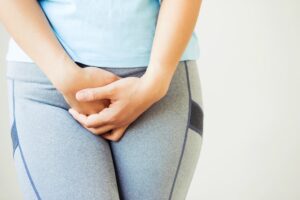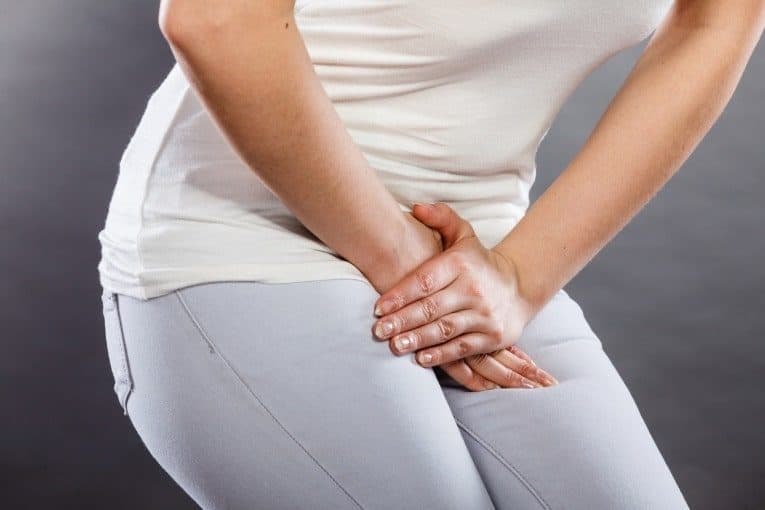As women journey through perimenopause, a myriad of changes take place within their bodies, and some of these changes can bring about unexpected challenges. One such challenge that often remains unspoken is vulvar itching. This discomfort can be not only physically irritating but also emotionally distressing, impacting the overall well-being of women during this transitional phase. In this blog, we will delve into the causes of perimenopausal vulvar itching and explore effective perimenopause itching vulva treatments, empowering women to navigate this aspect of their journey with knowledge and confidence.
Contents
Why Perimenopause Causes Itching Vulva?
 Perimenopause, the transitional phase leading up to menopause, is marked by hormonal fluctuations as the body changes reproductive function. These hormonal shifts can have various effects on different parts of the body, including the vulva. The vulva, consisting of the external female genitalia, can experience itching during perimenopause due to several factors:
Perimenopause, the transitional phase leading up to menopause, is marked by hormonal fluctuations as the body changes reproductive function. These hormonal shifts can have various effects on different parts of the body, including the vulva. The vulva, consisting of the external female genitalia, can experience itching during perimenopause due to several factors:
- Estrogen Levels
Estrogen, a key hormone in female reproductive health, decreases during perimenopause. This decline can lead to changes in the vulvar tissue, causing dryness and a decrease in elasticity. Dry, less supple skin is more prone to irritation and itching.
- Vaginal pH Changes
Estrogen plays a role in maintaining the acidic pH of the vagina. As estrogen levels decrease in perimenopause, the vaginal pH may become less acidic, creating an environment that is more conducive to the growth of certain microorganisms. Imbalances in the vaginal microbiome can contribute to vulvar itching.
- Thinning of Vulvar Tissues
Estrogen is responsible for maintaining the thickness of the vaginal and vulvar tissues. Reduced estrogen levels during perimenopause can lead to the thinning of these tissues. And making them more vulnerable to irritation, itching, and even microtears.
- Decreased Blood Flow
Hormonal changes can affect blood circulation to the genital area. Reduced blood flow may contribute to dryness and a lack of nourishment in the vulvar tissues, potentially causing discomfort and itching.
- Altered Immune Response
Hormonal fluctuations can impact the immune system’s response. Changes in the immune function may make the vulva more susceptible to infections or inflammation, leading to itching.
Understanding these physiological changes can help women navigate perimenopausal symptoms, including vulvar itching, with informed choices and targeted interventions. Consulting with a healthcare provider is crucial for personalized advice and appropriate treatment.
How Can I Calm My Vulva From Itching?
 Calming vulvar itching can often be achieved through natural treatments and lifestyle adjustments. It’s important to note that individual responses may vary, and consulting with a healthcare professional is advisable for persistent or severe symptoms. Here are some natural remedies that may help alleviate vulvar itching:
Calming vulvar itching can often be achieved through natural treatments and lifestyle adjustments. It’s important to note that individual responses may vary, and consulting with a healthcare professional is advisable for persistent or severe symptoms. Here are some natural remedies that may help alleviate vulvar itching:
Hydration
Ensuring proper hydration is fundamental to maintaining healthy skin, including the delicate tissues of the vulva. Water helps to moisturize the skin from within, preventing dryness that can contribute to itching. Aim to drink an adequate amount of water throughout the day to support overall skin health.
Cold Compress
Applying a cold compress to the affected area can provide immediate relief from itching and inflammation. The cold helps constrict blood vessels, reducing swelling and numbing the area. Ensure that the compress is wrapped in a thin cloth to prevent direct contact with the skin, and apply it for short intervals to avoid overexposure.
Topical Coconut Oil
Virgin coconut oil is rich in fatty acids and possesses anti-inflammatory properties. Applying a thin layer to the vulva can help moisturize and soothe irritated skin. Coconut oil is generally well-tolerated, but it’s advisable to do a patch test first to ensure there’s no adverse reaction.
Aloe Vera Gel
Aloe vera has long been recognized for its cooling and soothing properties. Applying pure aloe vera gel to the vulva can provide relief from itching and reduce inflammation. Ensure that the aloe vera gel is free from additives or preservatives that could potentially irritate.
Oatmeal Baths
Colloidal oatmeal is finely ground oatmeal that has anti-inflammatory and skin-soothing properties. Adding it to a warm bath can help alleviate itching and irritation. Soak for about 15-20 minutes, pat the skin dry, and avoid vigorous rubbing to preserve the soothing effects.
Probiotics
Probiotics contribute to the maintenance of a healthy bacterial balance, including in the vaginal and vulvar areas. Incorporate probiotic-rich foods like yogurt with live cultures into your diet. Alternatively, consider taking a probiotic supplement with strains specifically beneficial for vaginal health.
Wearing Breathable Fabrics
The choice of underwear and clothing materials plays a crucial role in vulvar health. Opt for underwear made from breathable fabrics like cotton, which allows air circulation and minimizes moisture buildup. Avoid tight-fitting clothing, as it can contribute to friction and irritation. These simple wardrobe choices can significantly reduce the risk of vulvar itching.
Avoiding Irritants
Harsh soaps, bubble baths, and scented products can disrupt the natural balance of the vulvar area and contribute to itching. Choose mild, fragrance-free soaps for intimate hygiene, and avoid using excessive force or scrubbing. This gentle approach helps maintain the natural pH balance and minimizes the risk of irritation.
Maintaining Proper Hygiene
Gentle and regular cleansing is essential for vulvar health. Use warm water and a mild, fragrance-free soap to clean the external genital area. Pat the area dry instead of rubbing to avoid friction. Excessive or aggressive cleansing can strip the skin of natural oils, contributing to dryness and itching.
It’s crucial to approach natural remedies with patience and consistency. If symptoms persist or worsen, seeking guidance from a healthcare professional is advisable. They can provide a thorough evaluation, identify potential underlying causes, and offer personalized recommendations based on your specific health needs.
What Are Some Best Perimenopause Ithcing Vulva Treatments?
 Effective perimenopausal itching vulva treatments may vary from person to person, and it’s essential to consult with a healthcare professional for personalized advice. However, here are some commonly recommended treatments for perimenopausal vulvar itching:
Effective perimenopausal itching vulva treatments may vary from person to person, and it’s essential to consult with a healthcare professional for personalized advice. However, here are some commonly recommended treatments for perimenopausal vulvar itching:
Hormone Replacement Therapy (HRT)
Hormone replacement therapy, particularly estrogen therapy, is a common approach for managing perimenopausal symptoms, including vulvar itching. Estrogen creams or tablets can be applied directly to the vulva to alleviate dryness and discomfort. However, the decision to undergo HRT should be made in consultation with a healthcare provider, considering individual health risks and benefits.
Topical Estrogen Creams
Prescription-strength estrogen creams specifically formulated for the vulvar area can help restore moisture and improve the thickness and elasticity of the tissues. These creams are applied directly to the vulva and are often effective in reducing itching.
Vaginal Moisturizers
Non-hormonal, over-the-counter vaginal moisturizers can provide relief from vulvar dryness and itching. These products are designed to hydrate the tissues and improve overall vaginal health. Regular use, as recommended by a healthcare professional, can help maintain moisture.
Prescription Medications
In some cases, healthcare providers may prescribe medications to address specific causes of vulvar itching, such as antifungal or anti-inflammatory medications. These treatments target underlying issues contributing to discomfort.
Dietary Supplements
Omega-3 fatty acids and vitamin E supplements may have anti-inflammatory properties that can benefit vulvar health. However, it’s crucial to consult with a healthcare provider before incorporating any supplements into your routine.
Pelvic Floor Physical Therapy
Pelvic floor physical therapy can be beneficial for addressing pelvic floor muscle dysfunction and associated vulvar symptoms. A trained physical therapist can provide exercises and techniques to improve muscle tone and reduce discomfort.
Counseling or Support Groups
Emotional well-being is an integral aspect of perimenopausal symptom management. Seeking counseling or participating in support groups can provide a space to discuss and manage the emotional impact of symptoms, including vulvar itching.
Remember, individual responses to treatments vary. Thus, it’s crucial to work closely with a healthcare provider to determine the most appropriate approach for your specific situation. They can conduct a thorough evaluation, consider your overall health, and tailor a treatment plan that addresses both the symptoms and any underlying causes of perimenopausal vulvar itching.
What Cream Is Good For Menopause Itchy Vulva?
One commonly recommended cream for relieving menopausal itchy vulva is a topical estrogen cream. Estrogen plays a crucial role in maintaining the health and thickness of vaginal and vulvar tissues. During menopause, the decline in estrogen levels can lead to dryness, thinning of the tissues, and increased vulnerability to irritation, all of which contribute to itching.
Topical estrogen creams, such as Estrace (estradiol) or Premarin (conjugated estrogens), are designed to be applied directly to the vulva. These creams help replenish estrogen levels in the local tissue, promoting the restoration of moisture, elasticity, and thickness. Regular use under the guidance of a healthcare provider can significantly alleviate menopausal vulvar itching, offering relief and improving overall vulvar health.
It’s important to note that while topical estrogen creams are effective for many women, they may not be suitable for everyone, and alternative treatments should be considered in consultation with a healthcare provider. So it’s essential to discuss any concerns or preferences with a healthcare professional to ensure the chosen cream aligns with your specific health needs and goals.
Conclusion
In conclusion, perimenopause itching vulva treatments involve a holistic approach to well-being. Understanding the underlying causes, such as hormonal changes and tissue thinning, empowers women to make informed choices for relief. Natural remedies like aloe vera, chamomile, and proper hydration offer gentle alternatives, while medical interventions such as hormone replacement therapy and topical estrogen creams provide targeted solutions. Lifestyle adjustments, stress management, and emotional well-being are integral aspects of navigating this journey.
Remember, seeking guidance from healthcare professionals ensures personalized care and the best strategies for reclaiming comfort during perimenopause. It’s about embracing a comprehensive strategy that combines natural remedies, medical interventions, and self-care. If you are facing menopause-related issues, menopause treatment at HerMantra can help. Book your free trial online menopause treatment session now.


